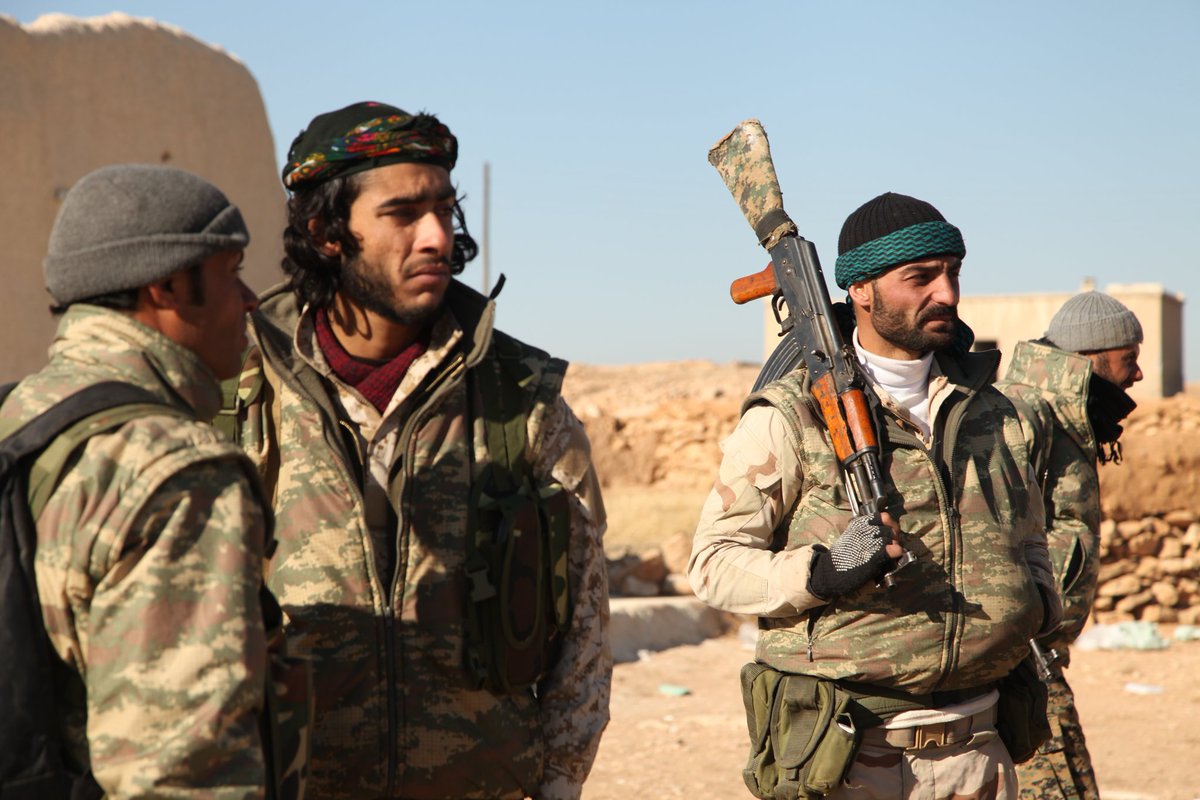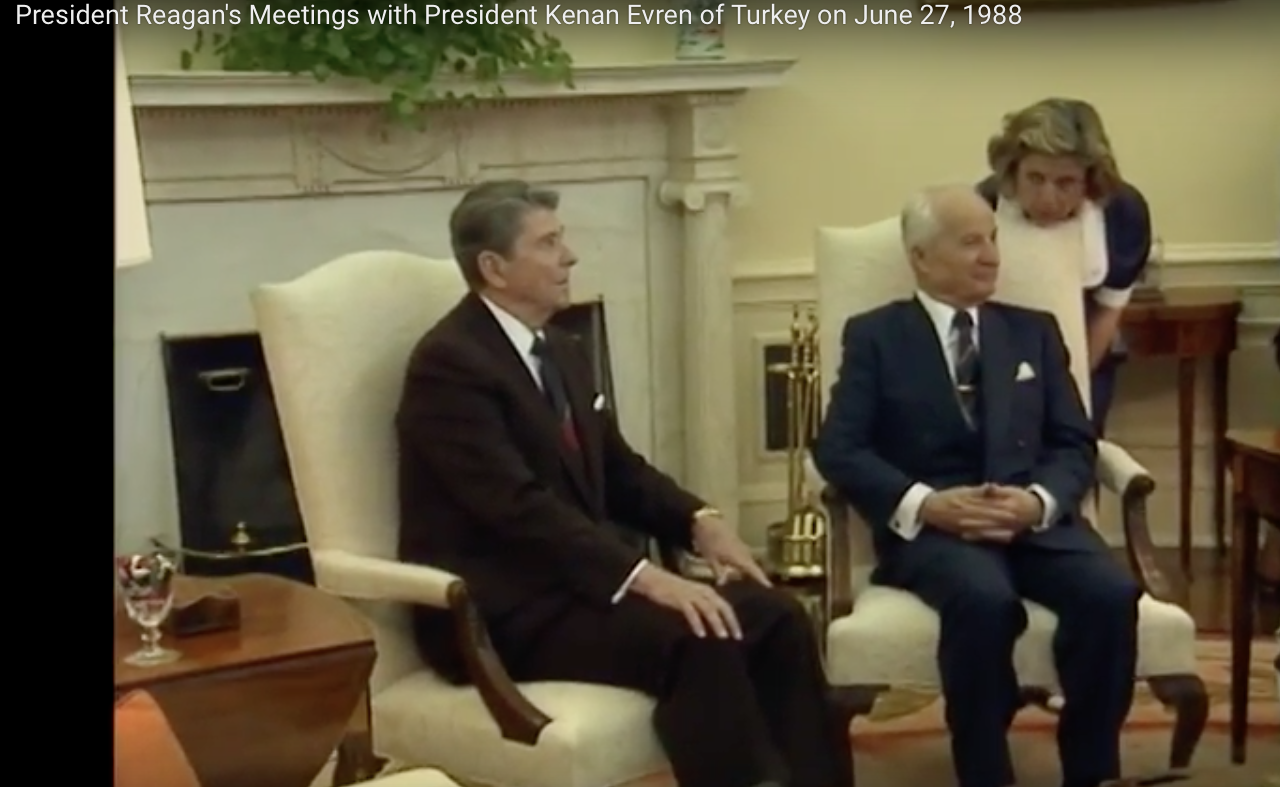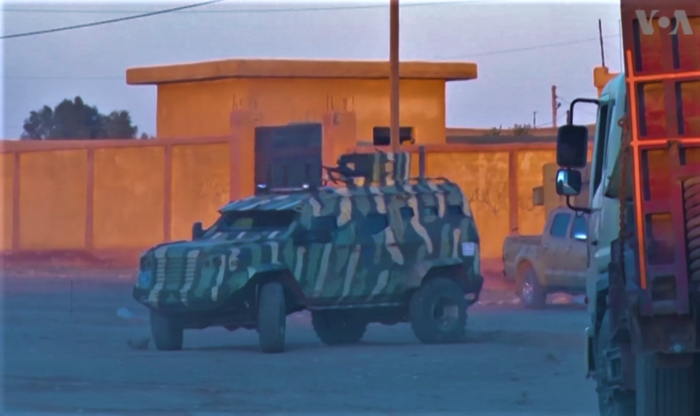As`ad AbuKhalil dissects the false U.S. show of humanitarian concern for people in Syria — Arab or Kurdish.
By As`ad AbuKhalil
Special to Consortium News
 The reaction was unanimous: the so-called idealist diplomats under former President Barack Obama and the neoconservatives under former President George W. Bush all reacted with great alarm to the news that President Donald Trump was withdrawing U.S. troops from northern Syria and that he had given the green light to Turkey’s President Recep Erdogan to launch his military operation against the Kurds.
The reaction was unanimous: the so-called idealist diplomats under former President Barack Obama and the neoconservatives under former President George W. Bush all reacted with great alarm to the news that President Donald Trump was withdrawing U.S. troops from northern Syria and that he had given the green light to Turkey’s President Recep Erdogan to launch his military operation against the Kurds.
The think tank and media establishment in D.C. finds fault with Trump, no matter what he does. The only exception was when Trump bombed Syria. Then the media and think tanks praised him for being presidential and for sending a message to enemies of the U.S. (Why do U.S. messages always have to be violent?) When Trump acts tough in foreign policy, he is praised. But he is often criticized for not being tough enough. If he shows softness in foreign policy, he is fiercely criticized for harming U.S. national security interests.
Media reaction is partly a reflection of the conventional wisdom of the war lobby in D.C. and partly the voice of the intelligence community. The New York Times and The Washington Post have emerged as the willing and uncritical outlets for intelligence agencies. The U.S. media publicize criticisms by unnamed military and intelligence officials while treating them as if they — not an elected U.S. president — should set foreign policy.
What Trump Did Not Realize
When Trump began criticizing the media and the intelligence agencies he did not, due to his political inexperience in Washington, realize that they can be more powerful than a U.S. president in setting the agenda for world media. Nevertheless, Trump retains his support among his core supporters where his popularity within his own party is higher than it was under President Ronald Reagan.
>>Please Donate to Consortium News’ Fall Fund Drive<<
Trump is discovering that criticizing U.S. wars from the outside is much easier than trying to end them from the Oval Office. The crisis in northern Syria did not start overnight, although the media just noticed. The U.S. media is now the voice of the war lobby and they wish to have the U.S. maintain a military force in almost all Arab countries. And once an American occupation starts, the media does not want it to end. Instead it amplifies arguments about the need to “protect allies” (usually armed mercenaries) or “maintain vital U.S. interests” or “keep the peace” (even though the U.S. military presence always causes more bloodshed and exacerbates tensions), or stand firm against U.S. enemies (and naturally the enemies of Israel).
The U.S. media and D.C. foreign policy establishment raised alarm when Trump — during his campaign and later as president— suggested that he wished to withdraw troops from Syria, just as they raised alarm about Trump’s plan to withdraw troops from Afghanistan. But Trump has proven firmer against the U.S. military-intelligence apparatus than Obama, who would bend under the slightest pressure from the military.
The U.S. has not only kept an occupation force in Syria (in the north and the south, in addition to a years-old occupation “presence” in Jordan), but has also created militias in Syria (just as it created militias in Iraq during the occupation years). And the Kurdish militia (the YPG, or People’s Protection Unit) is a leftist group which has aligned itself with the U.S. in Syria, and carved a separate zone for Kurds.

Kurdish YPG fighters. (Kurdishstruggle via Flickr)
Kurdish Historical Suffering
There is no question that Kurds in the Middle East have suffered historically from mistreatment and repression by Arabs, Turks and Iranians.
Turkey, under the pro-U.S. military dictatorship of Kenan Evren tormented the Kurds and caused the deaths of thousands. The U.S. media largely ignored this slaughter when Turkey was on excellent terms with the U.S. and Israel.
The Kurds also suffered from the brutal campaigns of Iraq’s Saddam Husayn, which culminated in the use of chemical weapons in 1987. In Syria, the repressive regime of Hafidh Al-Asad and his son Bashshar ignored the legitimate demands of Kurds for cultural and administrative rights.
But Kurds have also suffered at the hands of their own tribal (as in Iraq) or political (as in Syria) leadership. Those leaders have betrayed Kurdish rights by allowing the destiny of Kurds to be tied to the foreign policy calculations of outside powers (the U.S. or Israel or Saddam, etc). And the U.S. has betrayed the Kurds repeatedly over the years and even turned a blind eye when Iraq’s Saddam Husayn used chemical weapons against them.

Still from video of the state visit by former Turkish President Kenan Evren, at right, to President Ronald Reagan at the White House. (Reagan Library/Wikimedia Commons)
Hostile Alignments
Among Arabs, however, sympathy for the Kurds diminished because Kurdish political leaders have aligned themselves with enemies of the Arabs (the U.S. and Israel at various points). When an ethnic minority aligns itself with the major enemy of the majority (Israel, which has been an ally of the Barzani clan in Iraq since the 1970s at least) it should not expect that sympathy for its cause would grow among its fellow citizens. The repressed ethnic minority when it sets a foreign policy which runs counter to the public mood of the majority population will encounter resentment and anger. (It is unfortunate that we still talk about majorities and minorities but that indicates — in the West and the East — that equality of citizenship has not been accomplished).
The Kurds deserve recognition of their religious, cultural and even political rights but the question of independence does not receive support from the non-Kurds who live in and around areas where Kurds live. It is easy for Western countries to make generous offers of territorial independence to Kurds when the lands are not Western-owned. And the U.S. and other Western countries in the 21stcentury don’t handle demands for independence kindly in their own countries (whether it is Spain or France). During the U.S. Civil War, General William T. Sherman deliberately mounted a brutal campaign of destruction and burning in Georgia and elsewhere in the south to make the dream of independence difficult in the future.
Some leftists in the West support the YPG simply because it is a leftist party. But the leftism of the YPG should count against it, not for it. Why and how does a leftist party align itself with a government with a long record of staunch anti-communism, in the U.S. and around the world? What is the leftist argument for aligning with U.S. imperialism? If the justification invokes self-preservation, this clearly has not worked: not in Iraq when the Barazanis aligned with the U.S. in the 1970s only to be betrayed; and not in Syria today, where the U.S. is abandoning the Kurds and allowing the Turkish government to attack them. [Until a Russia-Turkey deal on Tuesday].

An SDF IAG Guardian armored personnel carrier in February 2017, one of several supplied by the United States to the SDF. (Zana Omar, Wikimedia Commons)
The notion that there is a progressive force in Syria named the Syrian Democratic Forces is an American invention which the media was more than pleased to promote to further the cause of U.S. military intervention in Syria and the Arab world. But a U.S. general, Raymond Thomas, at the Aspen Institute told the truth in 2017 when he admitted that he slapped the name SDF on the YPG in order to allay Turkish fears.
The notion that the U.S. led an effort of Arabs and Turks fighting side by side was a propaganda ploy. And the media highly exaggerated the role of YPG and U.S. troops in defeating ISIS (most of the fighting against ISIS was done in Syria, Iraq and Lebanon by foes of the U.S. and Israel — but that is not something the U.S. media are going to concede).
The U.S. was in Syria for reasons that have nothing to do with the Kurds, and the U.S. media exhibit great hypocrisy when they again feign humanitarian concern for people in Syria — Arabs or Kurdish. U.S. media have warned against “unreliable” and brutal Syrian rebels fighting with Turkey: but those are none other than the Free Syrian Army which U.S. politicians and journalists alike had promoted.
Trump is facing a revolt from his military-intelligence apparatus and from the foreign policy establishment over his attempt to fulfill campaign promises to end U.S. wars started by his predecessors. The U.S. media are proving to be more eager for war and military intervention than the military establishment itself. They exhibit great concern for the plight of empire precisely because they are an actual arm of empire. But the media and foreign policy establishment should not worry too much; Trump announced that he planned to maintain a U.S.military force in Syria to protect an oil field. If that does not count as humanitarianism what will?
As’ad AbuKhalil is a Lebanese-American professor of political science at California State University, Stanislaus. He is the author of the “Historical Dictionary of Lebanon” (1998), “Bin Laden, Islam and America’s New War on Terrorism (2002), and “The Battle for Saudi Arabia” (2004). He tweets as @asadabukhalil
If you value this original article, please consider making a donation to Consortium News so we can bring you more stories like this one.
Before commenting please read Robert Parry’s Comment Policy. Allegations unsupported by facts, gross or misleading factual errors and ad hominem attacks, and abusive or rude language toward other commenters or our writers will be removed. If your comment does not immediately appear, please be patient as it is manually reviewed. For security reasons, please refrain from inserting links in your comments.
>>Please Donate to Consortium News’ Fall Fund Drive<<

“Some leftists in the West support the YPG simply because it is a leftist party. But the leftism of the YPG should count against it, not for it. Why and how does a leftist party align itself with a government with a long record of staunch anti-communism, in the U.S. and around the world? What is the leftist argument for aligning with U.S. imperialism?”
Brilliantly put Dr AbuKhalil!
As a leftist who was generally sympathetic to the PKK/YPG, it was rather depressing to see them leave their compatriots languishing under ISIL rule while they took a detour to steal Syria’s oilfields located in predominantly Arab areas. And if that wasn’t bad enough, they abandoned their people in Afrin to the tender mercies of the Turkish-backed militias comprised of Jihadi thugs who had temporarily “patched over” from ISIL, Al Nusra and Ahrar Al-Sham!
The Syrian govt has always sought good relations with the YPG throughout the war, offering it a prominent role in the new Syria that will emerge after the defeat of the imperialist’s scheme for regime change. The key weakness of these Kurdish “leftist” movements seems go be their complete disinterest in working with other leftist and secular forces in the states in which they operate, and their chauvinist obsession with statehood at any cost despite the damage it may cause to the interests of working people in the existing states of the region. Surely a revitalized, secular and socialist Syria free from imperialist domination is a more secure basis for Kurdish self-determination than a statelet surrounded by jihadi-infested chaos and dependent on imperialist largesse?
The Syrian war has revealed the utter bankruptcy of wide sections of the western left, and serves as a convenient litmus test to separate true anti-imperialists from virtue-signalling opportunists.
The Kurds have a well-documented history of hiring themselves out to the highest bidder for the purpose of slaughtering whomever they are told to by their employers. Any questions? …start with the Armenians.
‘The Kurds” are not a monolith, even within Syria. They’re as fractured in terms of politics, leadership, and local priorities as the Arabs of the anti-Assad Syrian resistance.
photo of reagan & evran: looks like Ronnie was dropped at the rodeo with no way home on his own
Why is it surprising that t-rump’s popularity with his base surpasses even his fellow hard-sell huckster? Americans have always loved us some righteous indignation, rather than do right by indigenous nations.
This article is valuable to me, thank you. I guess this might be called a response.
2 moves
deep, at least how far this depravity reaches;
its spectacular barrage, clash of titans (you wish) thing,
then – who scurries-in under your majestic skirts?
Brownshirts, head scarves bear brokered arms
to spread another fly-blown breath.
That hairy grin maniacally claws for purchase
to piggyback your slippery shoulders,
as you shrug your way to conquest.
Who runs the clock?
Who plans three moves deep?
Who guards the door?
At what price do scribes of many cloaks
lawyer-up your heinous crimes, years
in advance of –
when will they come due
& how?
Thank you again Professor AbuKhalil for another cogent and considered piece on the ever existing ongoings in the ME.
While one can feel some sympathy – although I have to admit that I’m hard put to do so – with the Kurds over the decades if not the centuries, I also consider them to be all too willing to betray their compatriots in whichever country they dwell. And all in order, apparently, to carve out a country of their own (interestingly – from what I seem to recall from my recent reading – some of the territory they claim in Iraq and Syria includes oil/gas fields; would they be so keen did these lands not?).
But Syria – even more so than perhaps present day Iran and Iraq – has many different ethnic and religious groups within its borders: just a few include Druze, Jews, Christians, Yazidis, Shia (Alaouite) and Sunni. If the Kurds were to have their own statelet – why not each of these groups (also scattered around the region)?
Moreover, in India there are many ethnic groups, some of greater numbers than the Kurds (one of the reasons, I have read, for justifying their need, righteous need, for their “own” statelet). Where are the cries for them to have their own states? (Not as if some of those ethnic/religious groups haven’t had to deal with violence and discrimination.) What of the Roma people? Indeed, what of the Native Americans, the indigenous Australians, the indigenous peoples throughout Latin America? And then there are the Palestinians whose lands have been stolen and are still being stolen from them for over 70 years. Where are the crocodile tears in the MSM for the Palestinians – a far more beleaguered, injured, oppressed, and deprived people than are or have been the Kurds?
Clearly the Kurds do not see themselves as Syrians, Iraqis, Iranians (the Turks – well, they only view “Turks” as Turks and the Kurds there, while the largest ethnic minority remaining in Turkey, are not the only ones to have endured violence, brutality and discrimination from the Turkish government (Armenians, Greeks, Alevis [Shia in the Alaouite way] among others have also been at the very sharp end of dominant Turkic repressive rule). Betrayal begets hatred, loathing. Doubtless non-Kurdish Iraqis, Syrians do not feel a lot of amicability toward their Kurdish compatriots given the latter’s willingness to side with the illegal invasion and bombing by the Yanks.
One of the author’s links notes:”Trump announced that he planned to maintain a U.S.military force in Syria to protect an oil field.” The revenues of that oil field to go to the Kurds.
The issues surrounding Trumps decision regarding the Kurds is discussed in Washington as if the Syrian Government and the Syrian people do not exist. We are giving the revenues of the oil field to the Kurds by stealing them from the Syrian Government and its people. The most logical conclusion is that we are giving the revenues to the Kurds for the very reason that they deprive Syria of them.
The tactics of our game plan may change but the strategy stays the same.
Before moving overseas I lived in Pensacola Beach, Florida. I would have a beer at a little beach bar, where I met a gentleman who worked as a consultant on embassy security. He had been a marine assigned to security at embassies before leaving and establishing his own company. We had many conversations over time since I travelled extensively and he showed an interest. He told me US embassies were not intended to be primarily the representative of the US to the host country, but as a base to further US political interest, corporate interest and security interest (i.e. CIA). No doubt, this can be said of other countries as well, but what he told me next totally surprised me. He suggested if I was ever in a country during a major coup or social upheaval, I should never go to the US embassy for assistance because they were most probably directly involved in any current coup or unrest. He added that if assisting a citizen jeopardizes ongoing policy then policy comes before assisting US citizens. That more or less explains US policy in the middle east and elsewhere.